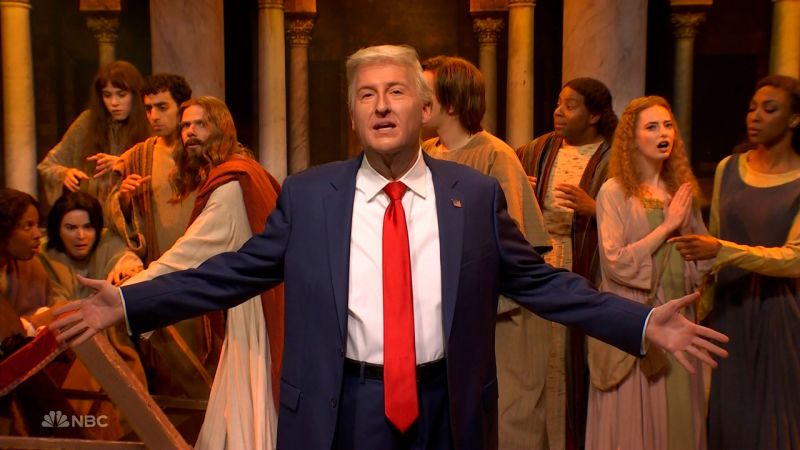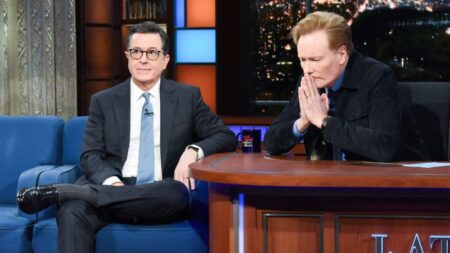In a time when political and economic turbulence has captured headlines across the United States, the iconic TV program “Saturday Night Live” (SNL) used its platform to satirize these pressing issues in its latest episode. The show’s opening sketch, infused with religious imagery, juxtaposed the chaos in Washington and Wall Street with biblical references, leading to an engaging and thought-provoking performance. With comedic flair, Mikey Day took on the role of Jesus, performing a parody of Matthew 21:13 where Jesus famously expelled money changers from the temple, setting the tone for the episode’s narrative that reflected on contemporary socio-political climates.
Entering the cold open, James Austin Johnson embodied the character of former President Donald Trump, cleverly drawing a parallel between Trump’s administration and the biblical incident. “It’s me, your favorite president, Donald Jesus Trump. Comparing myself to the son of God once again,” was one of Johnson’s comedic lines, revealing a keen understanding of both humor and satire. Further into the skit, he whimsically claimed, “Many people are even calling me the Messiah because the mess-I-ah made out of the economy. All because of my beautiful tariffs.” This line not only brought some levity to the serious issues of the day but also subtly critiqued the economic policies that spurred the United States trade wars and their consequences.
Johnson’s Trump then went on to describe the stock market in terms reminiscent of the Resurrection: “The stock market did a Jesus,” he said, humorously indicating its wildly fluctuating performance by stating it “died” and then “was risen.” By using religious imagery to describe stock market trends, SNL invited viewers to consider the absurdity in how economic crises are perceived in society, especially during times of financial decline. His reference to the stock market’s recent plummet was underscored with the context of billions lost, bringing an edge of reality to the comedic narrative.
In a particularly telling moment, Johnson’s character made a dubious sales pitch with the phrase, “We must never mix religion with commerce,” directly contrasting the biblical principles with a tongue-in-cheek promotion of his fictitious “Trump Bible,” marketed at an outrageous price of $1,300. This satire highlighted the often-bleak interaction between politics and commerce in America, framing it as an absurd dichotomy that critics have long discussed.
Tackling audience engagement further, the episode welcomed Jon Hamm, known from “Your Friends & Neighbors,” as the host, alongside Lizzo bringing musical talent to the forefront. Hamm’s presence lent star power to the night, elevating the spectacle while Lizzo’s performance was further infused with social commentary. Notably, her shirt emblazoned with the word “Tariffied” during her rendition of “Still Bad” was a clever nod to the episode’s overarching theme, illustrating how artistic expression can serve as both entertainment and social critique.
As the night progressed, Johnson reprised his role as Trump in another sketch titled “The White Potus,” inspired by HBO’s “The White Lotus.” This sketch explored themes of denial in the face of an impending global economic crisis, paralleling the storyline of a father discovering he’s under federal investigation while on vacation. The choice of title alone showcased SNL’s clever wordplay and adept use of contemporary pop culture to create relevant comedic narratives around real-world events.
With only a few episodes remaining in the show’s 50th season, this installation of “Saturday Night Live” was a fitting representation of how comedy continues to provide insightful commentary on the socio-political landscape. By the conclusion of the episode, viewers were left pondering the absurdities of current events while also entertained by the blend of satire and heartfelt performances, reaffirming SNL’s critical role in shaping public discourse through humor. The 50th season of “SNL” is set to wrap up on May 17, a date that many fans will be eagerly anticipating to see how the cultural zeitgeist continues to unfold through the lens of comedy and parody.











